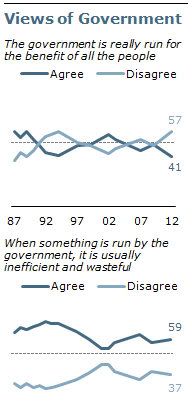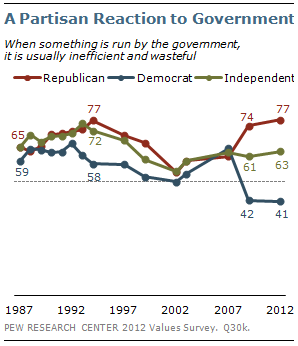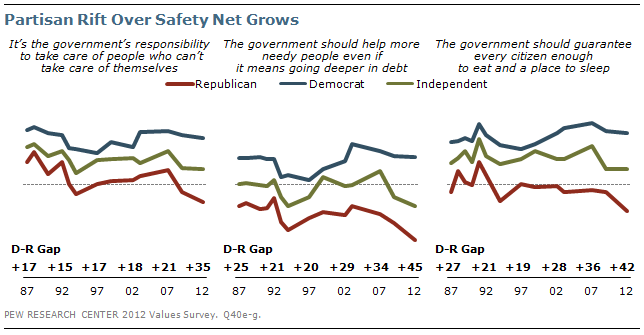While the information about polarization is very interesting to me, looking at the specifics actually sent me into one of those moods that are very common for me - looking for the big picture of what's happening and trying to get a handle on why. I think the groundwork for some of these trends was started a long time ago and will equally take years to turn around.
For example, Ronald Reagan capitalized on the growing distrust of all major institutions - including government - during the 1980's following Vietnam, Watergate and President Carter's perceived ineffectiveness. He told us that "government wasn't the solution, but was the problem." I doubt Pew was polling these kinds of questions in FDR's days during the Great Depression. But I think we can imagine what the numbers would have looked like back then. On the other hand, here's what has happened over the last 25 years.

On that question Pew found one of the biggest divides currently between Republicans and Democrats. But what is telling is the extent to which Independents have bought into the Republican view.

And what's really shocking is that 41% of Democrats agree with that statement. This is why I've been saying for a while now that the only way to advance a liberal cause is to advance the idea of good government. But its is where the poutrage contingent on the left is so adept at shooting themselves in the foot. Their constant focus on critiques of government - whether it be Republicans or Democrats - without ever acknowledging the successes (much less celebrating them), has contributed to this problem.
The second thing I notice in these trends is the way the Republican's Southern Strategy is still at work. I see it in the ongoing deterioration of support for our safety nets.

It's troubling to think about the fact that support is dropping for the safety net among both Republicans and Independents at a time when we've been experiencing the worst economy in our history since the Great Depression. Why would that be? I think that when most people are asked to think about "people who can't take care of themselves" or "needy people," the picture that enters their mind is not one of poor white working class people or the elderly/disabled. After years of the subtle strategy of equating those references to "welfare queens" or "street thugs," the picture is of black and/or brown faces. And then the racism kicks in.
So when, as a country, we have come to believe that our one collective endeavor - government - is ineffective, and that attempts to ease the burden of our economic times are met with racist stereotypes, we as liberals have our work cut out for us if we are ever going to make any headway. But that's our job.
The bottom line is that our job is harder than the conservatives' job... It's easy to dismantle government safety nets; it's harder to transform those safety nets so that they work for people and can be paid for...But that's our job. And I firmly believe that whenever we exaggerate or demonize, or oversimplify or overstate our case, we lose. Whenever we dumb down the political debate, we lose. A polarized electorate that is turned off of politics, and easily dismisses both parties because of the nasty, dishonest tone of the debate, works perfectly well for those who seek to chip away at the very idea of government because, in the end, a cynical electorate is a selfish electorate. - Barack Obama, 2005




Things that make me scream: something run by govt is inefficient and wasteful...compared to what?Enron? GM? MGM Studios? Context, people, context!
ReplyDeleteIf you control the context of the question, you control the answers. Guess who's been really, really good at that over a generation?